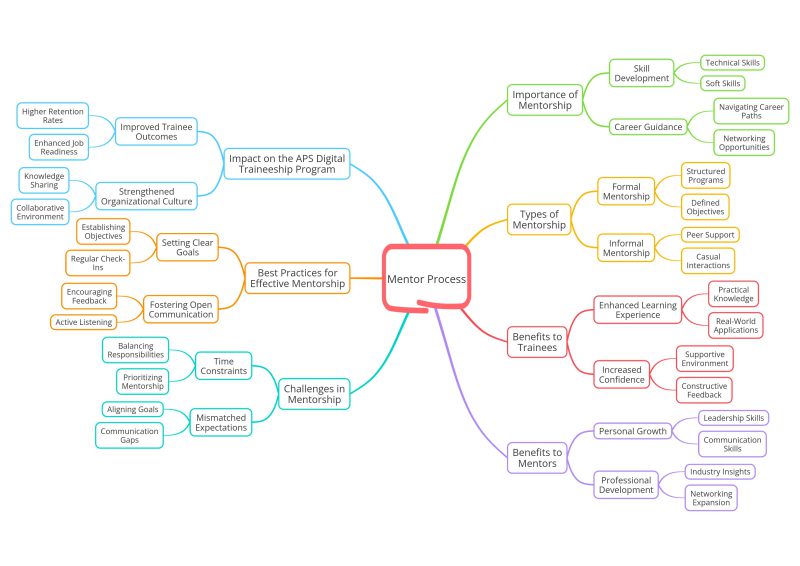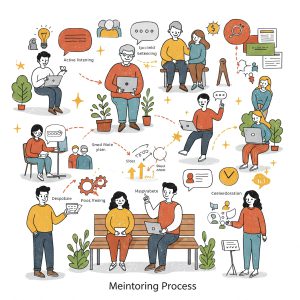Mentoring Process and Structure
Mentoring Process and Structure
The Multifaceted Role of Mentors in the APS Digital Traineeship Program
In the Australian Public Service (APS), the Digital Traineeship Program provides a unique opportunity for experienced professionals to guide the next generation of public sector talent. As part of this process, mentors play multiple roles—each critical to the personal and professional development of their mentees.
Mentoring is more than just answering questions or providing encouragement. It’s about shaping confidence, competence, and career clarity in new professionals, especially in a rapidly evolving digital landscape.
Key Roles of an APS Mentor
Mentors in the APS wear many hats to support their mentees’ development. These roles often include:
🧭 Guide
Helps mentees navigate public sector systems, structures, and values.
🌟 Role Model
Demonstrates APS values such as integrity, service, accountability, and respect in day-to-day conduct.
🛠️ Coach
Provides honest, constructive feedback and helps mentees improve through deliberate practice.
📚 Resource
Shares useful tools, documents, digital platforms, and knowledge of APS-wide opportunities.
🤝 Sponsor
Advocates for the mentee when appropriate and helps broaden their professional network.
🧠 Assessor (not evaluator)
Reviews mentee work such as reports or code, provides context-based feedback, and encourages reflection—without stepping into a performance manager role.
🔎 Note: Mentors are not counsellors or line managers. For personal support or HR matters, mentees should contact their supervisor or agency EAP.
What Mentors Help Mentees Build
Mentors in the program help mentees enhance the following key attributes:
Competence – technical knowledge, digital skills, and workplace capabilities
Self-confidence – belief in their ability to grow and contribute
Self-direction – capacity to manage their own goals, timelines, and learning
Professionalism – conduct, communication, time management, and ethical awareness
Mentors can demonstrate how to:
Use time and task management tools
Work across APS teams
Navigate digital platforms
Communicate with stakeholders
Stay resilient and adaptable in complex environments
The Mentee’s Role and Responsibilities
Effective mentoring relationships are built on reciprocity. For mentees, this means:
Taking initiative – scheduling meetings, setting agendas, and tracking goals
Being open – sharing background, challenges, and aspirations
Engaging with feedback – asking for it, reflecting on it, and applying it
Showing effort – completing agreed tasks or learning actions
Being honest – admitting when they need help or clarification
💡 Mentees who are proactive and engaged are seen as “worth the time” by mentors.
Key Activities for Mentors
Mentors in the APS program may:
Review work (e.g., documentation, code, project tasks)
Offer insight into APS processes and expectations
Demonstrate professional habits and approaches
Provide hands-on feedback and learning exercises
Recommend relevant communities, courses, or tools
Reflect on their own practice and continuously develop
🛑 But they do not:
Do the mentee’s work
Replace supervisors or manage performance
Provide counselling or therapy
Avoiding Common Pitfalls
While mentoring can be rewarding, mentors should be cautious of:
Overcommitting – saying “yes” too often due to wanting to help
Perfectionism – feeling pressured to always have the “right” answers
Scope creep – going beyond the mentor role into solving mentee’s work or life issues
Instead, set healthy boundaries, communicate expectations early, and remember:
“Mentoring means lighting someone else’s candle without burning out your own.”
Mutual Benefits of Mentorship
The mentoring relationship is dynamic and should benefit both participants.
For Mentees:
Increased confidence and clarity
Better understanding of APS roles and responsibilities
Insights into digital careers and pathways
Expanded professional networks
For Mentors:
Personal fulfilment and professional development
Enhanced leadership and communication skills
Exposure to fresh ideas and technologies
Contribution to the future of the public service
Final Thoughts
Mentoring in the APS Digital Traineeship Program is a collaborative, evolving partnership. It thrives when both parties bring:
Curiosity
Respect
Commitment
Openness to growth
Whether you’re guiding or being guided, the mentorship experience helps build a stronger, smarter, and more resilient public service.


